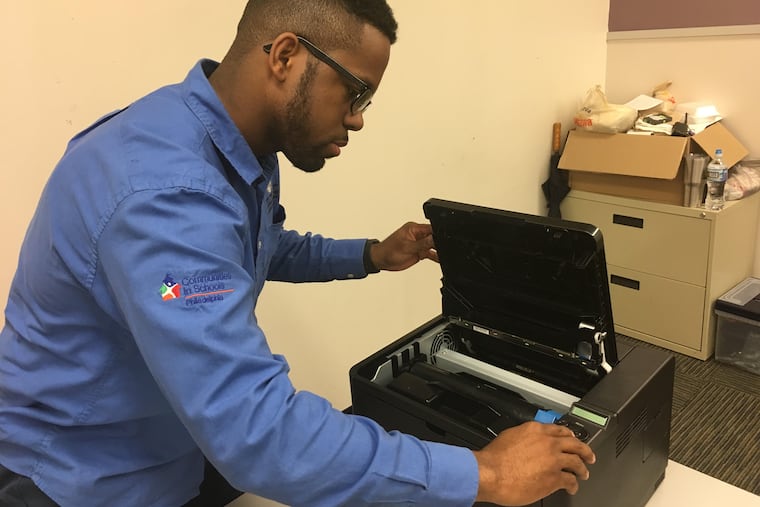Tech apprenticeship program trains homegrown talent in high-paying skills
A long-running apprenticeship program, Urban Tech Program, seeks to train high school graduates and working-age adults to become tech specialists. It has gotten a boost during the pandemic.

Midway through his second summer semester at Temple University in 2017, Gregory Johns-Miller realized he didn’t have the money to continue his finance degree. Johns-Miller, who earlier that year received his associate’s degree from the Community College of Philadelphia after paying out-of-pocket, knew he was going to have to change course.
A friend recommended Johns-Miller apply to the Urban Technology Project, or UTP, an apprenticeship program that teaches high school graduates and career changers the fundamentals of Information Technology. Johns-Miller biked to the UTP office on North Broad Street that same day. Johns-Miller, 26, graduated from the project’s Computer Support Specialist program in July, and got a salaried position as an IT specialist at Vaux Big Picture High School in Sharswood. By December, he had saved enough to purchase his first house.
“I’ve been able to show people that although things don’t always go the way you plan them, there still are alternative routes and you can be successful going that route,” Johns-Miller said.
In the 18 years since UTP launched as a partnership between the School District of Philadelphia and Communities In Schools of Philadelphia Inc., over 500 aspiring tech workers have passed through the project’s two programs that place apprentices in the city’s public schools. UTP prepares its participants — who, in 2020, were 95% people of color and 45% female — with the soft skills, specialized knowledge, and hands-on experience they need to secure employment in a growing and well-paying field. A survey of program alumni found that 88% of 89 respondents remain in the tech sector.
“For a lot of low-income people of color, college is out of reach because of the price tag,” said Shana Savage, assistant director of IT apprenticeships at UTP. “Apprenticeships remove that barrier where you can’t get to the middle class without that golden ticket of a college degree.” Savage said one of the major program goals is to show employers there is local talent with the skills and certifications to thrive in technology jobs and diversify the mostly white field.
This past year, as schooling moved online, the demand from the district for IT specialists soared. During the current school year, 42 schools requested apprentices compared with 28 schools last year. Six preschools requested tech specialists from UTP this year, a first. UTP has also seen an increase in interest in the program as Philadelphians seek out a more “pandemic-proof” career path, Savage said.
UTP offers two programs. In the Digital Service Fellow pre-apprenticeship program, high school graduates between the ages of 18 and 24 learn the fundamentals of IT through classroom instruction while also working alongside a digital literacy specialist in the School District to teach skills, such as coding basics.
Digital Service Fellows, or DSFs, receive a stipend of $16,000 per year over the two years of the program as well as benefits such as a monthly SEPTA pass and use of a laptop. The fellows also leave with a $6,195 scholarship to continue their education from AmeriCorps, who funds the program for 24 people each year.
In the Computer Support Specialist, or CSS, program, which is funded by the School District, individuals with one year of experience in IT or with one IT certification are placed as computer specialists in public schools throughout the city where they work on the schools’ overall technology needs.
There is no age restriction and this program attracts many participants looking to pivot into a new career, Savage said.
CSS apprentices receive an annual stipend of $23,500 plus an additional $1,000 for each certification they obtain throughout the three years of the program. They also get the same benefits as DSF scholars.
CSS apprentices leave the program with a CompTIA certification that will indicate to potential employers they have the skills for an entry-level IT job, though many CSS apprentices — like Johns-Miller — go on to get job offers from the school district.
According to the U.S. Bureau of Labor Statistics, the median pay for computer support specialists in 2019 was just under $55,000 a year, while computer network support specialists collected a median salary of $63,460. The jobs outlook for the field promises to grow by a faster-than-average rate of 8% between 2019 and 2029, according to the BLS.
E.D. Serrano-Martinez has been working as a computer support specialist at Juniata Park Academy in Feltonville for three years. Serrano-Martinez, whose first language is Spanish, said they have seen the value of connecting with parents of the mostly Hispanic school population in their first language while troubleshooting technology issues that have arisen during distance learning this year.
“I feel like it’s sometimes a cultural thing because I can understand them on a different level and relate to them a little more,” Serrano-Martinez said. “We create a camaraderie together and it helps diffuse some of the anger” in an already challenging year.
This is Serrano-Martinez’s last year as an apprentice. Through networking opportunities throughout their duration in the program, Serrano-Martinez has started to feel out companies they would like to work for come the end of the school year.
“I don’t want to leave, but the program is a stepping stone,” Serrano-Martinez said. “The whole point is to get a job in the field and go on to bigger things.”